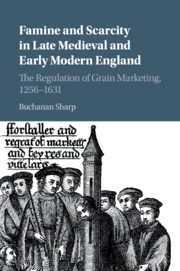Description
Famine and Scarcity in Late Medieval and Early Modern England
The Regulation of Grain Marketing, 1256–1631
Author: Sharp Buchanan
This book examines governmental and crowd responses to famine, from the late Middle Ages through to the early modern era.
Language: English
Subject for Famine and Scarcity in Late Medieval and Early Modern...:
Approximative price 31.58 €
In Print (Delivery period: 14 days).
Add to cart
Famine and Scarcity in Late Medieval and Early Modern England
Publication date: 06-2020
Support: Print on demand
Publication date: 06-2020
Support: Print on demand
Approximative price 107.81 €
In Print (Delivery period: 14 days).
Add to cart
Famine and Scarcity in Late Medieval and Early Modern England
Publication date: 09-2016
274 p. · 15.8x23.6 cm · Hardback
Publication date: 09-2016
274 p. · 15.8x23.6 cm · Hardback
Description
/li>Contents
/li>Biography
/li>
Surveying government and crowd responses ranging from the late Middle Ages through to the early modern era, Buchanan Sharp's illuminating study examines how the English government responded to one of the most intractable problems of the period: famine and scarcity. The book provides a comprehensive account of famine relief in the late Middle Ages and evaluates the extent to which traditional market regulations enforced by thirteenth-century kings helped shape future responses to famine and scarcity in the sixteenth century. Analysing some of the oldest surviving archival evidence of public response to famine, Sharp reveals that food riots in England occurred as early as 1347, almost two centuries earlier than was previously thought. Charting the policies, public reactions and royal regulations to grain shortage, Sharp provides a fascinating contribution to our understanding of the social, economic, cultural and political make-up of medieval and early modern England.
Introduction; 1. Early market regulation to 1327; 2. The response of Edward II and his government to the Great Famine; 3. The food riots of 1347; 4. Royal paternalism and the response to dearth, 1349–1376; 5. Scarcity and food riots, 1377–1439; 6. Harvest failure and scarcity in the reign of Henry VIII; 7. The official language of the Commonwealth and the popular response to scarcity in the reign of Henry VIII; 8. The moral economy, 1547–1631 and beyond; Bibliography; Index.
Buchanan Sharp is Emeritus Professor of British and European History at the University of California, Santa Cruz. His research focuses on the social history of early modern England and, in particular, popular protest. He is the author of In Contempt of all Authority: Rural Artisans and Riot in the West of England (1980) and co-editor of Law and Authority in Early Modern England: Essays Presented to Thomas Garden Barnes (2007).
© 2024 LAVOISIER S.A.S.




